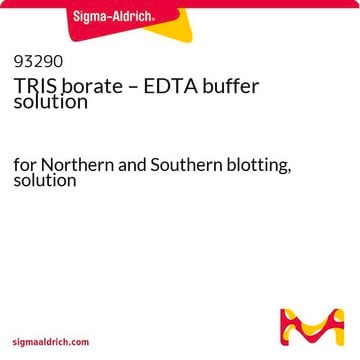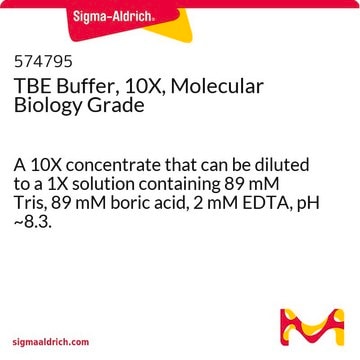T3913
Tris-Borate-EDTA buffer
5× concentrate, powder blend
Synonym(s):
TBE buffer
About This Item
Recommended Products
Quality Level
form
powder blend
technique(s)
electrophoresis: suitable
impurities
DNase, RNase and NICKase, none detected
pH
8.1-8.5 (25 °C, 5 ×)
solubility
water: 85.1 g/L, clear, colorless
suitability
suitable for gel electrophoresis (after dilution to working concentration)
application(s)
diagnostic assay manufacturing
SMILES string
OB(O)O.NC(CO)(CO)CO.OC(=O)CN(CCN(CC(O)=O)CC(O)=O)CC(O)=O
InChI
1S/C10H16N2O8.C4H11NO3.BH3O3/c13-7(14)3-11(4-8(15)16)1-2-12(5-9(17)18)6-10(19)20;5-4(1-6,2-7)3-8;2-1(3)4/h1-6H2,(H,13,14)(H,15,16)(H,17,18)(H,19,20);6-8H,1-3,5H2;2-4H
InChI key
OSBLTNPMIGYQGY-UHFFFAOYSA-N
Looking for similar products? Visit Product Comparison Guide
Related Categories
Application
It may be employed for the following studies:
- As buffer system for the evaluation of molecular weights of glycoproteins of ovalbumin, avidin and fetuin by sodium dodecyl sulfate-pore gradient electrophoresis.
- For the hemoglobin electrophoresis in starch gel.
- Preparation of buffer concentration gradient gel for the rapid determination of DNA sequence.
Dilution of the TBE stock concentrates to a 1× TBE running buffer results in a buffer containing 89 mM Tris-borate and 2 mM EDTA, pH 8.3. The 5× or 10× stocks may also be added to an acrylamide/bis-acrylamide stock solution for making the PAGE gel. Applied voltages of less than 5 V/cm (distance between the electrodes of the unit) are recommended for maximum resolution.
Packaging
Preparation Note
Reconstitution
Signal Word
Danger
Hazard Statements
Precautionary Statements
Hazard Classifications
Repr. 1B
Storage Class Code
6.1C - Combustible acute toxic Cat.3 / toxic compounds or compounds which causing chronic effects
WGK
WGK 1
Flash Point(F)
Not applicable
Flash Point(C)
Not applicable
Personal Protective Equipment
Choose from one of the most recent versions:
Certificates of Analysis (COA)
Don't see the Right Version?
If you require a particular version, you can look up a specific certificate by the Lot or Batch number.
Already Own This Product?
Find documentation for the products that you have recently purchased in the Document Library.
Customers Also Viewed
Protocols
TAE and TBE are both used as running buffers for nucleic acid electrophoresis but have some important differences. Review our recipes and video to give your application the best chance of success.
TAE and TBE are both used as running buffers for nucleic acid electrophoresis but have some important differences. Review our recipes and video to give your application the best chance of success.
TAE and TBE are both used as running buffers for nucleic acid electrophoresis but have some important differences. Review our recipes and video to give your application the best chance of success.
TAE and TBE are both used as running buffers for nucleic acid electrophoresis but have some important differences. Review our recipes and video to give your application the best chance of success.
Our team of scientists has experience in all areas of research including Life Science, Material Science, Chemical Synthesis, Chromatography, Analytical and many others.
Contact Technical Service









